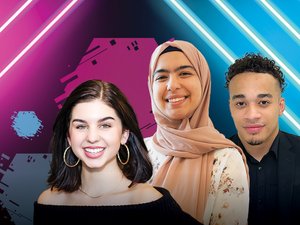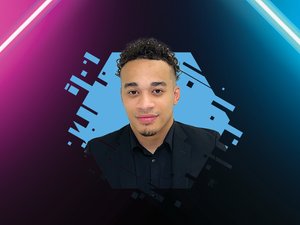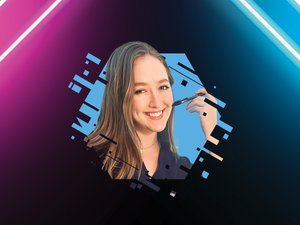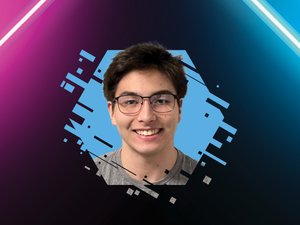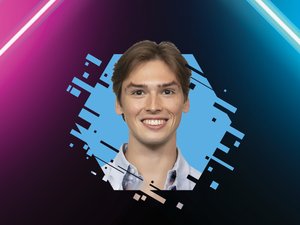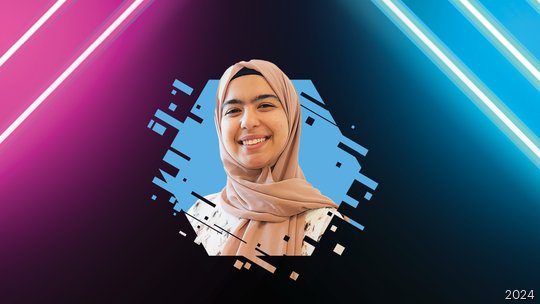
MONA JAWAD
Founder, ASL Aspire | Age: 23
Millions of deaf and hard-of-hearing students around the world do not have sufficient access to education. Mona Jawad, a Washington University doctoral student, launched a company, ASL Aspire, to address that problem through digital education tools, raising more than $275,000 in the last few years and reaching hundreds of students in eight countries since launching in April.
Jawad, 23, is a founder and active member of the Skandalaris Launchpad accelerator program at WashU's Skandalaris Center for Interdisciplinary Innovation and Entrepreneurship.
What inspired your interest in speech and hearing science? I’ve always loved how speech and hearing science can teach us about how we connect with one another. I have several members of my family who have hearing loss, and seeing their journeys to find the right support and technology to use really touched me growing up. There are beautiful systems within our brains and bodies that all come together to allow us to express ourselves, whether that be with the written word, sign language, or spoken language. I think it’s incredible that we can study that on the level of neurons, and learn from it how to make communication — and therefore connection to each other — more easily facilitated.
What does your doctoral work at Washington University look like? What are WashU's strengths in speech and hearing science? At WashU, my work is centered around how we can use machine learning to discover new patterns in data related to different domains of hearing science, like cell imaging and clinical outcomes. This might be a little biased, but I really believe the Program in Audiology and Communication (PACS) is one of the best departments on campus at WashU! With connections to both the audiology clinic and the school at the Central Institute for the Deaf, the program is inherently interdisciplinary, which means the research that we do can have real impact. That’s not to mention the wonderful community that the PACS department has facilitated. It’s such a joy to be able to work with deaf education students, audiology students, and researchers all in one space. Like with my team at ASL Aspire, there’s nothing better than sitting down with people who share the same mission as you, and working together to create a better world.
What sort of digital education tools does ASL Aspire create? How do they represent trends in Deaf education? Since Covid, digital education has been a hot topic. During lockdown, educators of the deaf who I spoke with told me that they quickly realized just how few tools were out there for their K-12 students in particular. We’re one of the first companies out there solving that problem. More than anything, we want our tools to be a source of empowerment for young children who want to learn, but may not know where to turn for fully accessible resources.
ASL Aspire creates games to teach STEM vocabulary to Deaf and hard-of-hearing students, in American Sign Language. Our team of Deaf scientists creates lessons in sign language that are built into a curriculum. Their work is at the core of everything we do. As engineers, professors, and mathematicians themselves, we want kids to not only learn from them, but to be inspired to take these incredible individuals as their role models.
Do you design the tools? Our chief information officer, Ethan Gaughan, leads the charge on designing all of the games, and we have some truly amazing engineers who bring the ideas to life. There have been so many helping hands involved in building ASL Aspire, from mentors to student interns to our long-term members. The diversity of our team has always been its greatest strength.
Tell me about your fundraising. How do you do that on top of your grad school work? The fundraising has 100% been a team effort, not an individual one. We pitch at competitions together, we write grant applications together, and we’ve traveled around the country together to share our passion with organizations and investors who have the same focus on accessibility that we do. The credit for that largely goes to my co-founder and chief operating officer, Ayesha Kazi, who is incredible at finding and securing non-dilutive funds. She’s also a master’s student, and we support each other so that we can get great work done both within the company and within our respective programs. My family has also been there for me since day one, when we were still just an idea struggling to become a reality.
What are your career goals? I believe that education belongs to everyone. My goal is to be a part of making that a reality for students around the globe. I also love both teaching and research. I aspire to make discoveries at the intersection of technology and biology, and to make that knowledge accessible to the general public.
Click on the links below to read profiles of this year's Inno Under 25 honorees:
